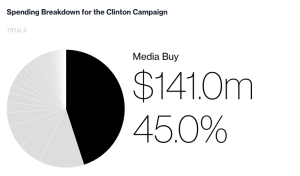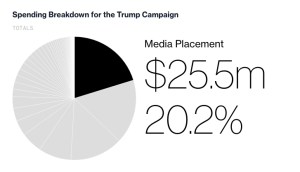We are approaching the end of what has been arguably the most unusual presidential election campaign of our lives. With social media taking a stronger place in disseminating the candidates’ messages and tweet rants, Wikileaks and Russian hackers releasing confidential information about back-door dealings, and the media demonstrating it has given up its neutrality as they try to sway people’s opinions about one or the other candidate, one wonders why do political campaigns still spend so much money on paid advertising. Does it in fact have a significant enough impact on voters opinion in order to help a candidate get elected?
For instance, Bloomberg News reports that Hillary Clinton’s campaign has spent $141.0 million in media buys, while Donald Trump took a gamble, with “only” $25.5 million (Allison, Rojanasakul, & Harris, 2016). Regardless, still a lot of money.
As it turns out, there are a few reasons why politicians still invest enormous amounts of money on advertising. According to a recent study by UCLA researchers, the persuasive effects of a political ad decays in less than one week (Kurtzleben, 2015). Given the short term effects of ads on influencing people’s opinion about candidates, it’s no wonder that the advertising becomes a battlefield, with candidates trying to outweigh their opponents.
A recent article on The Hill said that after a strong campaign of attack ads against Trump by the Clinton Campaign on key battleground states, that she had gained a lead in those polls. However, the article also noted that it is impossible to know if the ads were the actual reason for the lead, especially since Trump had a few campaign stumbles during that period (Stanage, 2016).
In summary, it is nearly impossible to say for sure how much all this spend in advertising impacts the results of an election. Ultimately it seems that candidates are forced into the race for ad placements just because their opponents also are, and no one wants to test whether or not going ad-free makes a difference. This year though, Trump as the unconventional presidential runner that he is, did not focus so much on advertising. Then again, his campaign was so unusual that too many factors are at play to attribute the outcome of this election to lack of advertising.
References
Stanage, N. (August 25, 2016). Clinton buries Trump in negative ads. Retrieved from http://thehill.com/homenews/campaign/292563-clinton-buries-trump-in-negative-ads
Allison, B., Rojanasakul, M., and Harris, B. (September 21, 2016). Tracking the 2016 Presidential Money Race. Retrieved from http://www.bloomberg.com/politics/graphics/2016-presidential-campaign-fundraising/
Kurtzleben, D. (August 19, 2015). 2016 Campaigns Will Spend $4.4 Billion On TV Ads, But Why? Retrieved from http://www.npr.org/sections/itsallpolitics/2015/08/19/432759311/2016-campaign-tv-ad-spending



2 Responses to Advertising Battlefields